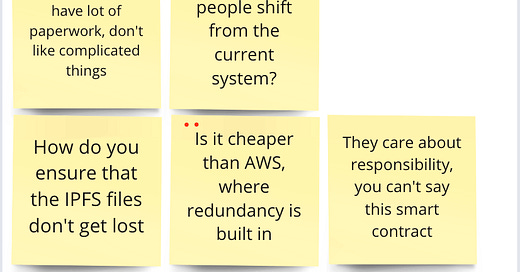The Apollo organizers have set up Open Mentor Sessions, twice a week on Monday and Wednesday, where hackathon participants can connect in Airmeet with experts from the infrastructure companies like Filecoin, ENS, Textile, Fleek, Unstoppable Domains, Pinata, libp2p, IPFS, and Kernel fellows.
We went to the first session in order to join the Fleek table. One of the cofounders, Brett, was the host. We listened in on a couple other inquiries and then took an opening to describe our project. Brett, who’s the CTO, suggested setting up a chat where we could have a multi-participant conversation in their Slack, and did so.
To start the convo we posted a summary of our problem:
Here’s context for our particular use case. We’ll have civil servants uploading various documents to the asset store. When they submit they’re required to fill in metadata (that goes beyond automatic aspects like date, file size, owner, etc).
The custom fields may include: title, language of the doc, inventory type, document category, document type, governing body, conference, publication year, and more. In short, we need to be able to record an array of metadata values with each asset uploaded.
Some of these values, like title, will be used in presentation when the frontend renders listings of documents. All of the values can be used as search criteria by researchers.
So we’re mulling over how to store these key/value pairs in a persistent way.
We got a reply from another cofounder, Harrison (turns out to be the CEO :-) explaining that for their Space Daemon app they use Textile buckets/threads for storing metadata in key/value pairs.
Thanks! Now we have some digging to do…

As suggested by Andrej from DeepWork, we used the Miro “Apollo Decision Jam” board template to collate and rank the feedback from the interviews.
In our case, since we already have a model with defined features for our product, there wasn’t a need for prioritizing, but the exercise did emphasize fundamental problems that we’re facing. Namely, what will we provide that improves on the current (web2) system that’s now in use at the UN? And as always, costs represent a bottom line that’s crucial to decisions in large institutions. Plus we need to work out who, i.e. which party, will be responsible for the storage platform.
That last point overlaps into governance. Coincidentally, the Fireside session next week delves into that convoluted topic. Maybe we’ll find some inspiration. 🔮



